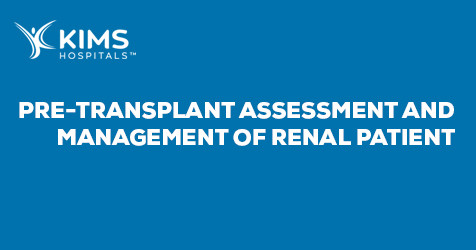WHAT IS KIDNEY TRANSPLANTATION?
When your kidneys finally stop working effectively, then you will need either dialysis or a transplant. It has been shown that kidney transplantation gives better quality and quantity of life than dialysis treatment, so it is in your best long-term interest, provided that you are fit enough to undergo it.
HOW AM I ASSESSED FOR KIDNEY TRANSPLANTATION?
You will be referred for consideration of kidney Transplantation once you are nearing (or have actually started) dialysis. Assessment does not depend on age or ethnic background but on whether you are fit enough to have the operation and to deal with the problems that can occur after surgery. So if you have evidence of heart disease, chest condition or other problems, special investigations will be undertaken to assess whether the risks are too great for transplantation. There will be a discussion between the transplant surgeons, your kidney doctor (nephrologist), specialists in other disciplines if necessary (such as a cardiologist or chest physician) and your GP, as well as yourself, before making a decision.
If you are considered fit for transplantation, doctors will conduct tests to check your tissue type and whether you have certain virus infections (Hepatitis B and C, HIV, Cytomegalovirus).
WHAT ARE THE RISKS INVOLVED IN TRANSPLANTATION?
There are a number of complications related to the transplant operation itself and then the more general risks attached to transplantation which is detailed below. As the operation involves joining blood vessels together and the ureter to the bladder there are risks of leaking or blocking. If the blood vessels leak this causes bleeding. This may require a blood transfusion or more uncommonly a further operation. If the blood vessels block this is more serious as the kidney will lose its blood supply and will usually have to be removed.
The anti-rejection immunosuppressive drugs partially suppress your immune system, which fights infection in the body, so you will be more prone to infection than you were on dialysis. Infections frequently involve the urinary tract and the transplant centre will undertake regular urine tests.
There is a risk of death in a small percentage of people the following transplantation, usually due to two main factors:
- A heart attack or other complication of the heart
- Severe infection
WHAT HAPPENS IN THE TRANSPLANT OPERATION?
The operation itself takes anywhere between one-and- a-half and three hours, although if there are difficulties it may take even longer. The key factor is not the length of the operation but the care with which it is performed. Technical factors within you and any anatomical abnormalities in the donor kidney will dictate the length of the procedure. The kidney is placed in the groin in your lower abdomen and can be put on either side. Your own kidneys will be left in place. The kidney’s vein is joined to your own iliac vein (which drains the blood from your leg), and the kidney’s artery is joined onto the iliac artery (which supplies your leg with blood). Once these blood vessels have been connected, the circulation to your kidney is released; the kidney becomes pink and may start to work more or less straight away. Indeed, urine may pass out of the ureter, the tube that joins the kidney to the bladder. The ureter is then joined to the bladder to complete the operation.
Often, a drainage tube is placed near the kidney, to drain out any blood or other fluid from the operation site. A catheter in your bladder drains the urine into a bag for monitoring. In addition to these tubes, you will return to the ward with one or two intravenous infusions and often a PCA (Patient Controlled Analgesia), which is a morphine infusion for pain control which you can adjust yourself.
HOW WILL I BE MONITORED AFTER THE OPERATION?
Immediately following the transplant, and sometimes before, you will start taking immunosuppressive medication to help prevent your body from rejecting the new kidney. The medicines that you are given to prevent rejection may not be entirely effective, and break-through “acute rejection” may occur, usually within the first six weeks after transplantation. Thereafter, the rejection episodes are much less common and are usually triggered by external factors and, most particularly, if you do not take your immunosuppressive drugs.
Once your kidney is working and stable, you will be discharged home.
WHY KIMS?
KIMS’ kidney transplant program is an essential component of a broad medical and surgical strategy to manage all patients with kidney disease with the therapy most appropriate to that patient, up to and including kidney transplants. With strong assessment and management strategies, KIMS ensures that Renal Transplant patients are always given priority.

